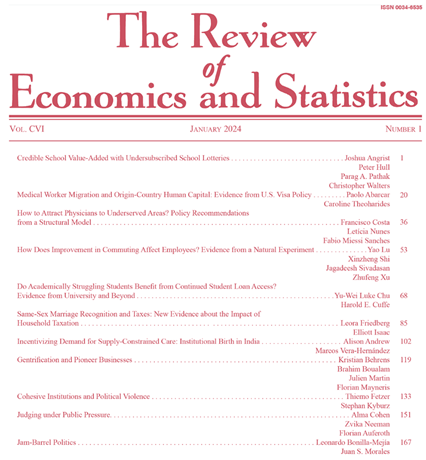自然选择、技术进步和人类长寿的起源
IF 6.8
1区 经济学
Q1 ECONOMICS
引用次数: 0
摘要
摘要本文认为,技术进步和人类寿命之间的反馈效应是它们在人类历史上共同出现的核心。它连接了两个主要的研究问题。首先,在灵长类动物中,人类更年期后的长寿命是一个独特但令人困惑的特征。其次,至少5万年前人类行为的转变导致了前所未有的技术进步,但这一转变至今仍未得到很好的理解。本文发展了一种基于后代数量和质量之间权衡的进化生长理论。它表明,早期的技术进步逐渐增加了知识代际转移的重要性。最终,生育优势转向了那些具有较高亲代后代投资和显著的生殖后寿命的个体。随后,人类寿命的延长加强了发展进程,为持续的技术进步奠定了基础。作为一个关键特征,该理论以一种全新的方式解决了关于人类行为“革命”的争论。它表明,现代行为的逐渐出现足以引发一场人口转变,在考古记录中,这种转变被称为“行为革命”。本文章由计算机程序翻译,如有差异,请以英文原文为准。
Natural Selection, Technological Progress, and the Origin of Human Longevity
Abstract This paper suggests that feedback effects between technological progress and human longevity lie at the heart of their common emergence in human history. It connects two major research questions. First, the long life span after menopause is a unique but puzzling feature of humans among primates. Second, the shift in human behavior at least 50,000 years ago, which led to an unprecedented pace of technological progress, is still not well understood. The paper develops an evolutionary growth theory that builds on the trade–off between the quantity and the quality of offspring. It suggests that early technological advances gradually increased the importance of intergenerational transfers of knowledge. Eventually, the fertility advantage shifted towards individuals that were characterized by higher parental investment in offspring and a significant post–reproductive life span. Subsequently, the rise in human longevity reinforced the process of development and laid the foundations for sustained technological progress. As a key feature, the theory resolves the debate about a “revolution” in human behavior in an entirely new way. It shows that a gradual emergence of modern behavior is sufficient to trigger a demographic shift that appears as a “behavioral revolution” in the archeological record.
求助全文
通过发布文献求助,成功后即可免费获取论文全文。
去求助
来源期刊

Review of Economics and Statistics
Multiple-
CiteScore
8.50
自引率
0.00%
发文量
175
期刊介绍:
The Review of Economics and Statistics is a 100-year-old general journal of applied (especially quantitative) economics. Edited at the Harvard Kennedy School, the Review has published some of the most important articles in empirical economics.
 求助内容:
求助内容: 应助结果提醒方式:
应助结果提醒方式:


